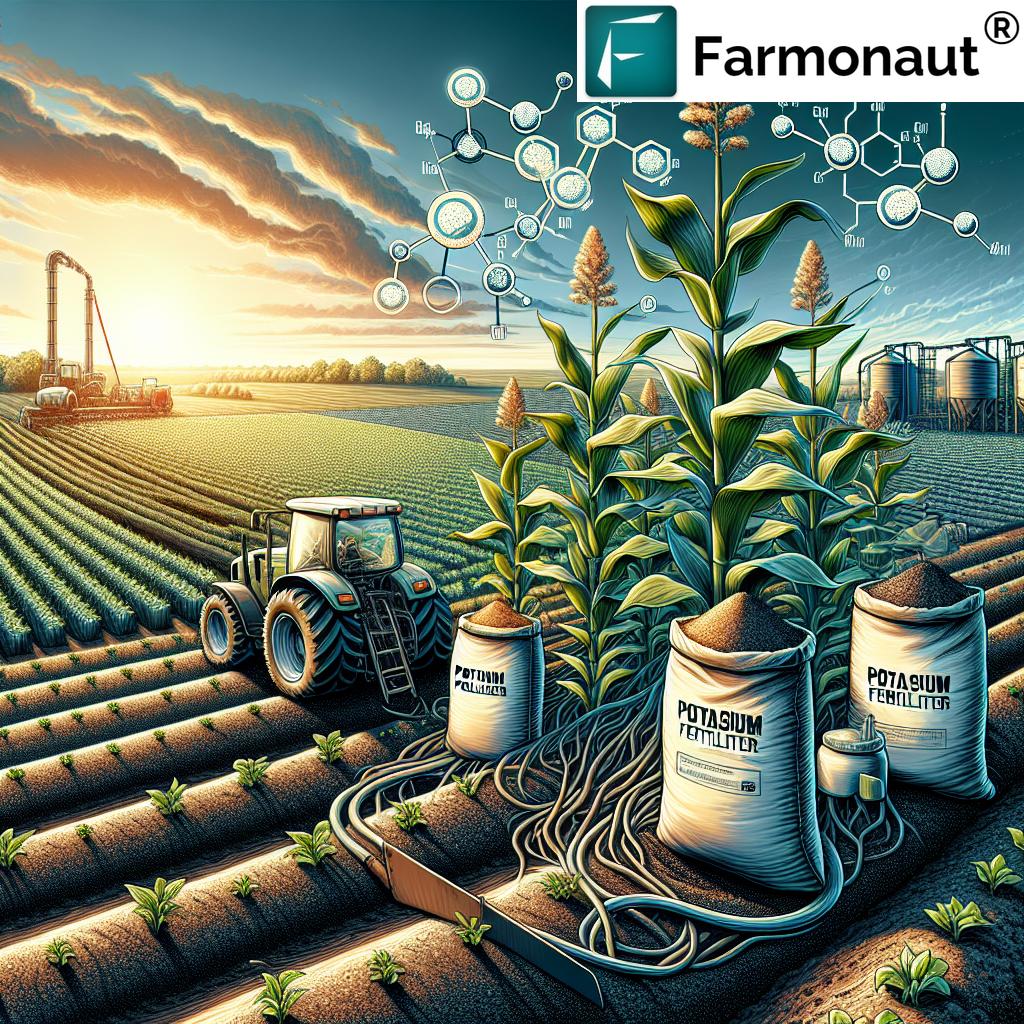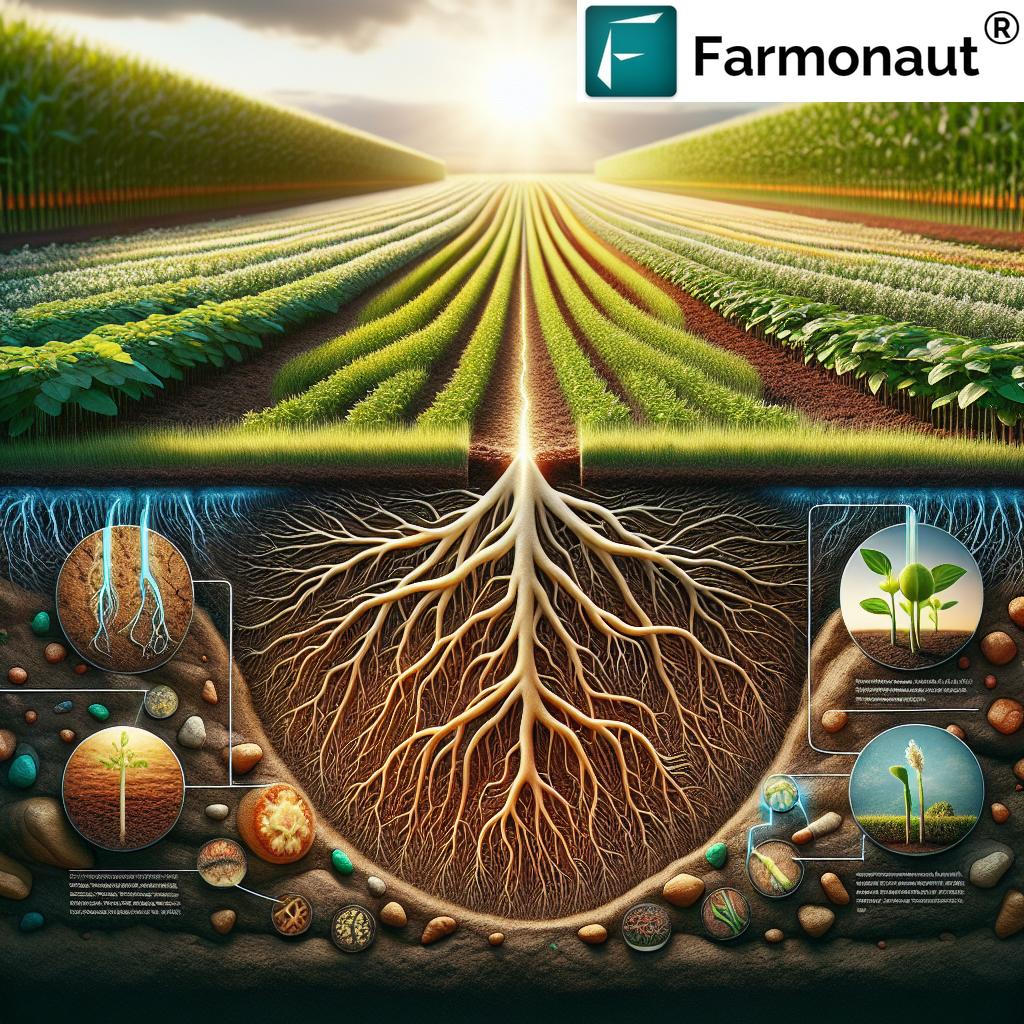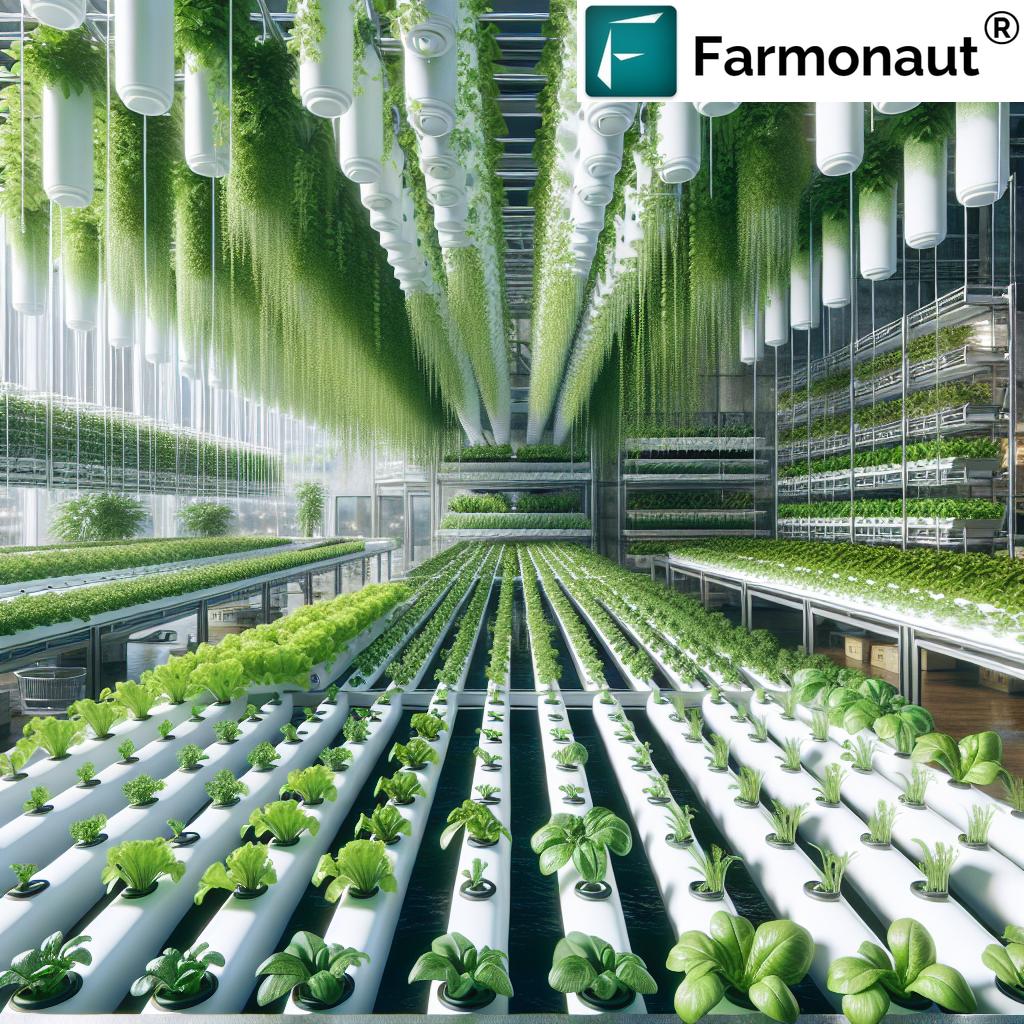How Potash Fertilizers Boost Soil Productivity: 7 Ways
“Potash fertilizers can increase crop yields by up to 40% in potassium-deficient soils, enhancing food security worldwide.”
Introduction: Understanding Potash Fertilizers
In modern agriculture, potash fertilizers play a vital role in enhancing soil productivity and ensuring sustainable food production. As our population grows and the need for increased crop yields intensifies, understanding the function of potassium-rich fertilizers becomes even more crucial.
Potash refers to a group of potassium-rich salts, primarily potassium chloride (KCl), potassium sulfate (K₂SO₄), and potassium-magnesium sulfate (K₂SO₄·MgSO₄). These compounds are mined from natural deposits or extracted from brines. After processing, potash products become water-soluble and are readily available to plants. The origin of the term ‘potash’ goes back to the historical method of leaching wood ashes in a pot to obtain potassium carbonate.
By integrating key practices such as precision agriculture, technological innovations, and integrated nutrient management, we can maximize the impact of potash fertilizers for our soil, crops, and the environment.
The Role of Potassium in Plant Growth
Potassium is an essential macronutrient required by plants in large quantities. It is involved in several key physiological processes that directly influence growth, development, and overall health.
Let’s examine the various functions of potassium in plant growth:
- Water Regulation: Potassium helps regulate stomatal opening and closing, controlling transpiration and water loss. This is particularly important for maintaining hydration, especially during drought conditions.
- Nutrient and Carbohydrate Transport: Potassium facilitates the movement of nutrients and carbohydrates within the plant, ensuring that energy and nutrients reach where they are needed for efficient growth and crop yield improvement.
- Strengthening Cell Walls: Adequate potassium levels strengthen plant cell walls, enhancing resistance to diseases and pests.
- Stress Tolerance: By improving internal regulation, potassium boosts the plant’s ability to withstand stresses such as heat, cold, and salinity.
The efficient application of potassium fertilizers not only ensures vital plant functions are sustained but also increases productivity, improves produce quality, and contributes to the resilience of our farming systems.
“Over 90% of potash produced globally is used in agriculture, driving innovation in sustainable soil productivity techniques.”
7 Ways Potash Fertilizers Boost Soil Productivity
Deploying potash fertilizers in agriculture, farming, and forestry can lead to profound and measurable benefits. Let’s break down the seven key ways in which potassium fertilizers elevate soil productivity enhancement and overall environmental sustainability.
1. Enhanced Crop Yields
Applying potash fertilizers ensures an adequate supply of potassium, which directly contributes to increased crop yields.
- Efficient nutrient uptake supports robust root development.
- Stronger plants can access essential water and nutrients deeper in the soil.
- Balanced nutrition results in improved plant health and higher productivity.
Potassium’s role in plant growth is so crucial that, in potassium-deficient soils, we can often see yields increase by up to 40% after proper potassium fertilizer application.
2. Improved Water Use Efficiency
Potassium is pivotal for stomatal regulation in leaves, affecting how efficiently plants use available water. This reduces water loss through transpiration, making crops more drought-resilient and enabling sustainable agriculture in water-scarce regions.
- Helps plants thrive during periods of drought or irregular rainfall
- Maximizes resource use efficiency and reduces wastage
- Promotes sustainable practices by lessening the need for intensive irrigation
3. Disease and Pest Resistance in Crops
Potash fertilizers promote the development of stronger plant cell walls, increasing resistance to diseases and pests. This reduces the need for chemical pesticides, allowing us to adopt more sustainable fertilizer practices.
- Lower incidence of fungal and bacterial diseases
- Improved pest resistance leads to more robust, resilient crops
- Decreases overall environmental impact of fertilizers and chemicals
4. Enhanced Quality of Produce
The adequate application of potash directly influences the quality of agricultural produce. Crops gain:
- Better size and weight due to optimal nutrient absorption
- Brighter color and improved taste
- Higher nutritional content, benefitting consumers and increasing market value
These improvements lead to better farmer income, stronger food security, and satisfaction across the agricultural value chain.
5. Soil Health Maintenance
Besides improving individual crops, potassium fertilizers contribute to the broader health of the soil ecosystem:
- Supports diverse microbial activity necessary for organic matter breakdown and nutrient cycling
- Maintains favorable soil structure for root growth and water infiltration
- Provides a foundation for long-term soil fertility and sustained food production
A balanced approach in the application of potash fertilizers is key to preserving the soil for future generations.
6. Nutrient Use Efficiency & Effective Nutrient Transport
Potassium acts as a ‘nutrient transporter’ within plants, ensuring that all critical nutrients and carbohydrates reach their intended destinations.
- Boosts plant nutrient efficiency by facilitating better utilization of nitrogen, phosphorus, and other macronutrients
- Enables plants to thrive even with lower rates of other fertilizers
- Helps reduce fertilizer waste and minimizes the risk of environmental runoff
When we employ precision agriculture for fertilization, using remote sensing and variable rate application methods, we maximize nutrient efficiency and reduce unnecessary input.
7. Stress Tolerance and Environmental Resilience
Crops with sufficient potassium levels exhibit higher tolerance to environmental stresses including heat, cold, drought, and salinity.
- Ensures crop survival during climatic fluctuations, which are becoming more common with global climate change
- Reduces crop losses and increases reliability for farmers and foresters in both agriculture and forestry contexts
- Encourages sustainable practices that match our need to both produce food and protect the environment
Comparison Table: Effects of Potash Fertilizers on Soil Productivity Parameters
The table above highlights measurable outcomes for each major aspect of soil productivity, demonstrating how combining potash fertilizers with precision agriculture and innovation yields maximum benefits for farms and forests.
Environmental Impact of Fertilizers & Sustainable Fertilizer Practices
While potash fertilizers are indispensable for soil productivity enhancement, their application must be managed to avoid adverse environmental impact:
- Nutrient Runoff: Over-application can cause potassium and other nutrients to leach into water bodies, increasing the risk of eutrophication and affecting aquatic life.
- Soil Salinization: Excess application can cause a harmful build-up of salts (particularly in arid and semi-arid regions), affecting plant growth and crop yields.
To mitigate these risks and ensure sustainability, we recommend these practices:
- Precision Agriculture: Use of satellite-guided soil sensors, GPS, and AI tools ensure potassium fertilizer application is both targeted and efficient. This minimizes nutrient runoff and environmental degradation.
- Integrated Nutrient Management: Combine organic and inorganic inputs, promote cover cropping, and use crop rotation to keep soils balanced and healthy.
- Monitoring and Assessment: Conduct regular soil tests to determine potassium levels and adjust fertilizer rates as needed for sustainability.
Farmonaut’s Carbon Footprinting feature gives agriculture professionals real-time insights on emissions, helping farms adopt sustainable fertilizer practices and comply with environmental regulations.
For organizations and food industry stakeholders, Blockchain-Based Product Traceability ensures supply chain transparency, building trust with consumers concerned about sustainability and ethical sourcing.
Precision Agriculture for Fertilization & Technological Innovations
Advanced technologies are transforming agriculture, forestry, and farming by making potash fertilizer management more efficient and environmentally conscious.
- Remote Sensing: Provides field-wide, high-resolution satellite imagery for real-time crop and soil monitoring.
- AI & Machine Learning: Enable data-driven fertilizer application and predictive modeling for optimal crop yield improvement.
- Blockchain: Delivers robust traceability for food origin and sustainable practices for ethical buyers.
- Automated Resource Management: Reduces waste, enhances logistics, and minimizes labor for large-scale farm operations.
With tools like Farmonaut’s Fleet Management, crop loan and insurance services, and Large-Scale Farm Management Suite, stakeholders can minimize operational costs as well as environmental impact while improving overall productivity.
Farmonaut Solutions for Efficient Potash Fertilizer Application
At Farmonaut, we are committed to democratizing precision agriculture by offering affordable, satellite-powered solutions globally. Here’s how our platform supports the efficient use of potash fertilizers and other inputs:
- Satellite-Based Crop Monitoring: Real-time crop health insights with NDVI, soil moisture, and yield estimation for fine-tuned fertilizer decisions.
- AI-Driven Advisory Systems: Jeevn AI delivers custom fertilizer strategies for each unique field, optimizing both productivity and environmental sustainability.
- Blockchain Traceability: Secure, transparent supply chain monitoring for crops and produce, ensuring responsible fertilizer and chemical use are traceable all the way to the consumer.
- Resource Management Tools: From vehicle fleet tracking to carbon emission monitoring, our suite helps agro-businesses maximize input use efficiency and lower their climate impact—Learn more on our Carbon Footprinting page.
Our mobile apps (Android here | iOS here) and web dashboard place this entire toolset in the hands of farmers, agribusinesses, and policymakers for actionable, data-driven farm management.
FAQ: Potash Fertilizers and Soil Productivity
Q1: What is potash and how is it used in agriculture?
Potash refers to potassium-rich salts, primarily KCl, K₂SO₄, and potassium-magnesium sulfate. It is used in fertilizer application to replenish soil potassium, a nutrient crucial for plant growth and soil productivity enhancement.
Q2: Why is potassium so essential for plant growth?
Potassium is a macronutrient needed in large quantities. It enables key physiological functions, such as water regulation, nutrient transport, and cell wall strengthening, supporting overall growth, stress tolerance, and resistance to diseases and pests.
Q3: Can potash fertilizers harm the environment?
Improper or excessive use can contribute to nutrient runoff and soil salinity. Following sustainable fertilizer practices (precision agriculture, soil testing, integrated nutrient management) reduces negative environmental impact of fertilizers.
Q4: How do potash fertilizers affect produce quality?
By ensuring adequate potassium levels, potash improves fruit size, color, and nutritional value, thereby increasing market value and consumer satisfaction.
Q5: Which technology helps optimize potash fertilizer application?
Remote sensing (satellite imagery) and AI-based advisory systems (like those found in Farmonaut apps) guide when, where, and how much fertilizer to use, boosting efficiency and minimizing waste.
Q6: Is there a difference between potassium chloride and potassium sulfate in fertilization?
Potassium chloride (KCl) is widely used due to its high potassium content and cost-effectiveness, but potassium sulfate (K₂SO₄) is preferred for chloride-sensitive crops and soils where additional sulfur is beneficial.
Conclusion: Potash for Sustainable Soil Enhancement
The use of potash fertilizers in agriculture is not just about replenishing essential nutrients but about transforming the way we farm for a more sustainable, productive, and resilient future. Potassium remains central to water regulation, nutrient transport, disease resistance, and overall soil health.
Adopting sustainable fertilizer practices and leveraging precision agriculture—from soil health monitoring, AI-based advisories, to blockchain supply chain solutions—empower us to boost yields, protect our environment, and ensure food security on a global scale.
Ready to implement the latest in soil and crop management? Get started today with Farmonaut’s satellite-powered platform.
Farmonaut Subscription Plans
Our subscription plans are designed for everyone—from individual farmers interested in precision fertilization and crop health monitoring to governments and enterprises in need of robust, scalable farm management. Choose the right plan for your operation and unlock access to the future of sustainable agriculture.














